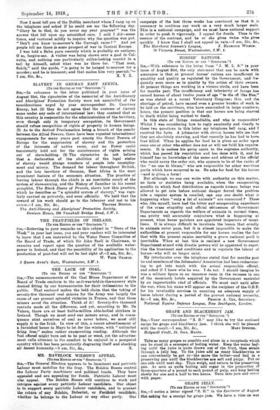SLAVERY IN GERMAN EAST AFRICA.
(To THE EDITOR OF THE " SPECTATOR.") SIR,—In reference to the letter published in your issue of August 31st, the signatories of the memorial of the Anti-Slavery and Aborigines' Protection Society were not unmindful of the considerations urged by your correspondent Dr. Courtney Kenny, but (1) they do not agree that the customs of slavery some under any code of international law; they contend that as this country is responsible for the administration of the territory, even though only in temporary occupation, its Government should refuse recognition of rights of property in human beings. (2) As to the desired Proclamation being a breach of the comity between the Allied Powers, there have been repeated international engagements for many years past among the Great Powers of Europe for the suppression of slavery and the protection of the interests of native races, and no Power could Consistently hold out for the maintenance of rights arising out of slave-holding. (3) The signatories do not believe that a declaration of the abolition of the legal status of slavery would plunge numbers of people into unemploy- ment and misery. The demand for labour throughout British, and the late territory of German, East Africa is the most prominent feature of the economic situation. The practice of forcing labour through the chiefs is an inevitable result of the system of slave-owning, and the Bishop of Zanzibar in his recent pamphlet, The Black Slaves of Prussia, shows how this practice, which he describes as "a splendid system of slavery," was regu- larly carried on privately, and even officially. We hold that the reward of his work should go to the labourer and not to his owner.—I am, Sir, &c., TRAVERS BUXTON. The Anti-Slavery and Aborigines' Protection Society, Denison House, 296 Vauxhall Bridge Road, S.W. I.


























 Previous page
Previous page